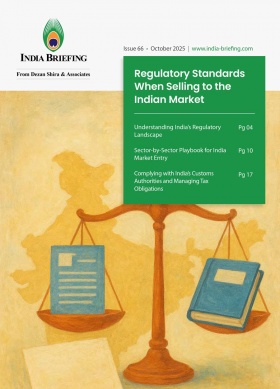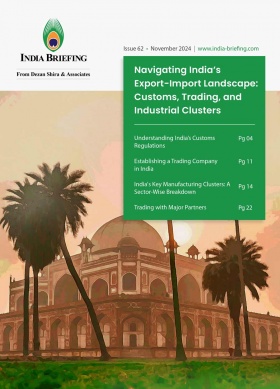Establishing a Trading Company in India
The process of establishing a trading company in India involves several steps. Success and profitability depend significantly on the importer or exporter’s comprehension of international procedures and India’s bureaucratic frameworks. Prospective investors must be familiar with key details of foreign trade agreements and policies.
Partnering with a local advisory firm can significantly ease this process – offering on-ground expertise, regulatory clarity, and procedural support that help businesses navigate licensing, compliance, and documentation requirements more efficiently.
India’s trade environment has evolved rapidly over the past decade, supported by digital reforms, streamlined procedures, and growing participation in global supply chains. The country’s Foreign Trade Policy (FTP) 2023 and National Single Window System (NSWS) have simplified the process of setting up trading and export-oriented businesses.
For investors and entrepreneurs, success in this space depends on understanding trade regulations as well as aligning with India’s evolving tax, compliance, and export promotion frameworks.
Step 1: Registering a business entity
The first step to starting a trading business in India is to incorporate a legal entity under the Ministry of Corporate Affairs (MCA). The incorporation process is fully digitized and can be completed through the MCA portal: www.mca.gov.in/mcafoportal/.
Permitted business structures
A trading business in India may be operated as one of the following legal forms:
- Sole proprietorship (for Indian residents only)
- Partnership firm
- Limited liability partnership (LLP)
- Private limited company (preferred for foreign investors)
- Public limited company
Foreign entities may also establish a presence in India through:
- Wholly owned subsidiaries
- Joint ventures
- Branch, liaison, or project offices (subject to Reserve Bank of India and FEMA approval)
Key incorporation documents
- Digital Signature Certificate (DSC)
- Director Identification Number (DIN) / Designated Partner Identification Number (DPIN)
- Approved company name (via SPICE Part A)
- Permanent Account Number (PAN) and Aadhaar (for resident directors or partners)
- Proof of identity and residential address of directors/partners
- Proof of registered office address and No Objection Certificate (NOC) from the property owner
- Declarations/e-declarations such as INC-9 form as required.
How to obtain a Digital Signature Certificate (DSC)
A Digital Signature Certificate (DSC) is an electronic signature used to verify identity in online filings, such as company incorporation, GST registration, and income tax submissions.
DSCs can be obtained from any government-licensed Certifying Authority (CA), such as eMudhra, Sify, NSDL, NIC, or Capricorn CA.
Applicants can:
- Approach a Certifying Authority directly with self-attested identity and address proofs (originals required for verification).
- Fill the form as required.
- Submit the documents such as Aadhaar, PAN, Passport or DL along with the photographs
- Do the Video KYC at their convenience.
- Use Aadhaar-based eKYC authentication (if offered by the CA), eliminating the need for physical document submission.
Obtaining a PAN card during incorporation
A PAN is mandatory for all business entities operating in India and is essential for tax filings and opening a business bank account.
For companies and LLPs, PAN is now issued automatically during the incorporation process through the MCA’s integrated SPICe+ (Simplified Proforma for Incorporating Company Electronically Plus) form. This form combines multiple registrations, including:
- Company incorporation
- DIN/DPN
- PAN and TAN issuance (via the Income Tax Department)
- EPFO and ESIC registration
- Professional tax and GST registration (optional)
Once incorporation is approved, the Certificate of Incorporation will include the PAN and TAN details. An e-PAN (digitally signed PAN card) is also sent to the company’s registered email address.
For partnerships, sole proprietorships, and foreign entities, PAN must be obtained separately through:
- Protean eGov Technologies (formerly NSDL) or UTIITSL portals;
- Submission of Form 49A (for Indian entities) or Form 49AA (for foreign entities), along with identity, address, and business proof.
Opening a business bank account
Once the incorporation process is complete and the Certificate of Incorporation and PAN are issued by the Authorities, the entity can open a current account with an authorized bank in India.
A current account is mandatory for conducting trade transactions, including imports, exports, and foreign exchange operations.
Banks will typically require:
- Certificate of Incorporation and PAN
- Memorandum and Articles of Association / LLP Agreement
- KYC documents (PAN, Passport, Aadhar or DL) of directors or authorized signatories
- Proof of registered office address
- Other forms such as FATCA, declarations etc.
Foreign-invested entities must additionally comply with Reserve Bank of India (RBI) and Foreign Exchange Management Act (FEMA) regulations for foreign currency transactions.
Step 2: Trademark/brand name or patent registration
Business owners pursue trademark registration to proactively protect their offerings from unauthorized use. In case of infringement, owners have the legal right to take action. In India, trademark registrations fall under the purview of the Controller General of Patents, Designs, and Trademarks, (Office of the Registrar of Trademarks), Ministry of Industry and Commerce, Government of India.
Both trademark and patent registrations can be obtained by submitting respective registration applications along with the prescribed fee. Once the application is approved, the business can be carried out under such name.
ISO 9001 Certificate
To obtain an ISO 9001 certificate, the company must follow all the rules and regulations outlined in the ISO 9001 Standard. Business organizations are entitled and eligible to obtain this certification, regardless of the size and scope of the business.
It is important to note, that ISO 9001 Certificate is not mandatory to obtain. However, certain sectors may need firms to acquire other ISO certification to meet regulatory standards.
The industry or field of operation can be anything from service to manufacturing. The ISO 9001 certificate is applicable for all business operations, from restaurants, manufacturing companies to consultancy, government entities, and more.
How to get ISO certified?
There are three crucial steps to be followed for obtaining the said certification:
- Application submission: Check the eligibility criteria and make sure your organization follows the Quality Systems Management (QSM) standards set by ISO 9001. Submit your application for certification.
- Assessment by the auditor: The performance of an organization is then audited by a Certification Body (CB or Registrar) against the latest version of ISO 9001 requirements.
- Certification: If the applicant organization passes the above-mentioned audit, the Registrar issues an ISO 9001 certificate. Once the certificate is registered for your organization, it is valid for three years.
Step 3: Registrations under tax laws
Every trading enterprise in India is subject to both direct and indirect taxes. Direct taxes are regulated under the Income-tax Act, 1961, while indirect taxes include the Goods and Service Tax (GST) regime and customs duties.
Income tax obligations under the Income Tax Act, 1961, mandate that business entities fulfill their tax liability through advance tax, Tax Deducted at Source (TDS), Tax Collected at Source (TCS), self-assessment tax, etc. Sole proprietorships pay taxes based on slab rates, while partnerships, companies, etc., adhere to fixed rates specified in the Income-tax Act. Entities responsible for TDS and TCS must obtain a Tax Deduction and Collection Account Number (TAN).
Under GST regulations, businesses must first obtain a Goods and Service Tax Identification Number (GSTIN) based on turnover limits. The turnover threshold for GST registration is INR 4 million (US$45,086.8) for suppliers of goods (excluding special category states) and INR 2 million (US$22,543.4) for special category states (Arunachal Pradesh, Manipur, Meghalaya, Mizoram, Nagaland, Sikkim, Tripura, Uttarakhand, and the Union Territory of Puducherry).
For service providers, the threshold is INR 2 million (US$22,543.4) (excluding special category states) and INR 1 million (US$11,271.7) for special category states. It is crucial to acquire the PAN of the entity before proceeding with GST registration, as the registration is PAN-dependent. Additionally, registration is necessary for every state where the business operates, and voluntary registration is an option for entities seeking Input Tax Credit (ITC) benefits.
Step 4: Registration and membership certificate (RCMC)
After completing your initial registration, the next step is to register with an Export Promotion Council (EPC) to obtain a Registration Cum Membership Certificate (RCMC).
The RCMC is similar to a stamp of approval for the company’s connection to a specific product category. It is mandatory for any firm applying for an authorization to import or export or to avail trade benefits and concessions under the Foreign Trade Policy.
The RCMC is valid for five years and must be renewed upon expiry or any change in business constitution.
Presently, there are 14 Export Promotion Councils under the administrative control of the Department of Commerce. They have branches all over the country and offer procedures based on state laws. They are:
- Engineering Export Promotion Council of India (EEPC);
- Project Exports Promotion Council of India (PEPC);
- Basic Chemicals, Cosmetics, and Dyes Export Promotion Council (Chemexcil);
- Chemicals and Allied Products Export Promotion Council (CAPEXIL);
- Council for Leather Exports (CLE);
- Sports Goods Export Promotion Council (SGEPC);
- Gem and Jewellery Export Promotion Council (GJEPC);
- Shellac and Forest Products Export Promotion Council (SHEFEXIL);
- Cashew Export Promotion Council of India (CEPCI);
- The Plastics Export Promotion Council (PLEXCONCIL);
- Pharmaceutical Export Promotion Council (PHARMEXCIL);
- Indian Oil Seeds and Produce Export Promotion Council (IOPEPC);
- Services Export Promotion Council (SEPC); and,
- Export Promotion Council for EOUs & SEZs (EPCES).
Step 5: Business agreements
Trading business also gives rise to contracts between the parties involved in trading. A written contract is important to avoid any kind of disputes in the future since the legal terms and conditions in the contract are binding on both the parties. Business contracts can be in the form of MOU (Memorandum of Understanding), Vendor Agreement, Lease Agreement, Insurance Agreement, Financial Agreement, etc.
Step 6: Further requirements for an import-export business
- Register under the MSME Act (Micro, Small & Medium Enterprises Act) and the Shops and Establishment Act, etc.
- Obtain licenses for specified categories of trading businesses like IEC (Import- Export Code).
- As mentioned in FTP, 2023, IEC is mandatory for export/ import from/to India and is issued by the DGFT in electronic form (e-IEC).
- Obtain clearance under the environmental laws for dealing with goods that may affect the environment, like hazardous goods, chemicals, etc.
Mandatory documents for export/ import of goods from/into India
(a) Mandatory documents required for export of goods from India:
- Bill of Lading/ Airway Bill/ Lorry Receipt/ Railway Receipt/Postal Receipt
- Commercial Invoice cum Packing List*
- Shipping Bill/Bill of Export/ Postal Bill of Export
(b) Mandatory documents required for import of goods into India
- Bill of Lading/Airway Bill/Lorry Receipt/ Railway Receipt/Postal Receipt in form CN-22 or CN 23 as the case may be.
- Commercial Invoice cum Packing List**
- Bill of Entry
[Note: *(i) As per CBIC Circulars issued under the Customs Act, 1962 (ii) **Separate Commercial Invoice and Packing List would also be accepted.]
(c) For export or import of specific goods or category of goods, which are subject to any restrictions/ policy conditions or require No-Objection Certificate (NOC) or product specific compliances under any statute, the regulatory authority concerned may notify additional documents for purposes of export or import.
(d) In specific cases of export or import, the regulatory authority concerned may electronically or in writing seek additional documents or information, as deemed necessary to ensure legal compliance.
Further, India’s Foreign Trade Policy 2023 has introduced a single window system for export of perishable agricultural produce, which is facilitated through the Agricultural and Processed Food Products Export Development Authority (APEDA).
ALSO READ: Import and Export Procedures in India
Step 7: Certificates of Origin
A Certificate of Origin (CoO) is crucial for verifying the legality and duty status of exported/imported goods. It identifies the country of manufacture and other relevant details of the product.
Indian exporters must obtain a Certificate of Origin from the authorized Indian agencies to avail the preferential benefits under all preferential trade arrangements/agreements. Online application for CoO can be made through the Common Digital Platform for issuance of certificate of origin of the Directorate General of Foreign Trade (DGFT), Department of Commerce.
The Certificates of Origin are issued online, and a unique number, i.e., UDIN (Unique Document Identification Number), and a QR code are available on every e-CoO for validation and authentication by user agencies.
Types of Certificates of Origin
- Non-preferential Certificate of Origin: This type indicates that exported/imported goods do not receive preferential tariff treatment, and standard duties apply to them.
- Preferential Certificate of Origin: This type is for goods eligible for preferential tariff treatment, which may involve reduced tariffs or complete tariff exemptions. It results from trade agreements between nations and regional trade associations, allowing special treatment for goods traded between them.
The Export Inspection Council (EIC) is authorized to issue the Certificates of Origin – both preferential CoOs and non-preferential CoOs.
EIC offices issue preferential Certificate of Origin for products from India under the following preferential trade arrangements/agreements:
- Preferential Tariff Schemes – An Overview
- Generalised System of Preferences (GSP)
- Global System of Trade Preferences (GSTP)
- Asia Pacific Trade Agreement (APTA)
- South Asian Free Trade Area (SAFTA)
- SAARC Preferential Trading Arrangement (SAPTA)
- Indo-Sri Lanka free Trade Agreement (ISFTA)
- India Afghanistan Preferential Trade Agreement (IAPTA)
- Into Thailand Free Trade Agreement (ITFTA)
- Indo Singapore Comprehensive Economic Co-operation Agreement (CECA)
- Indo Chile Preferential Trade Agreement (ICPTA)
- India MERCOSUR Preferential Trade Agreement (IMPTA)
- India Korea Comprehensive Economic Partnership Agreement (IKCEPA)
- ASEAN India Free Trade Agreement (AIFTA)
- India Malaysia Comprehensive Economic Cooperation Agreement (IMCECA)
- India Japan Comprehensive Economic Partnership Agreement (IJCEPA)
- India-Mauritius Comprehensive Economic Cooperation and Partnership Agreement (IMCECPA)
- India-UAE Comprehensive Economic Partnership Agreement (India-UAE CEPA)
(US$1 = INR 88.71)
(This article was originally published on February 27, 2024. It was updated on October 30, 2025.)
About Us
India Briefing is one of five regional publications under the Asia Briefing brand. It is supported by Dezan Shira & Associates, a pan-Asia, multi-disciplinary professional services firm that assists foreign investors throughout Asia, including through offices in Delhi, Mumbai, and Bengaluru in India. Dezan Shira & Associates also maintains offices or has alliance partners assisting foreign investors in China, Hong Kong SAR, Vietnam, Indonesia, Singapore, Malaysia, Mongolia, Dubai (UAE), Japan, South Korea, Nepal, The Philippines, Sri Lanka, Thailand, Italy, Germany, Bangladesh, Australia, United States, and United Kingdom and Ireland.
For a complimentary subscription to India Briefing’s content products, please click here. For support with establishing a business in India or for assistance in analyzing and entering markets, please contact the firm at india@dezshira.com or visit our website at www.dezshira.com.
About us
India Briefing is produced by Dezan Shira & Associates. The firm assists foreign investors throughout Asia from offices across the world, including in Delhi and Mumbai. Readers may write to india@dezshira.com for more support on doing business in India.
We also maintain offices or have alliance partners assisting foreign investors in Indonesia, Singapore, Vietnam, Philippines, Malaysia, Thailand, Bangladesh, Italy, Germany, Australia, and the United States.
- Previous Article India’s ECMS Scheme: Seven Electronics Manufacturing Projects Approved Worth US$625 Mn
- Next Article Copyright and Trademark Protection in India: Why It Matters for Businesses








